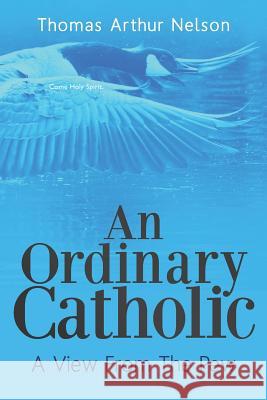An Ordinary Catholic: A View From The Pew » książka
An Ordinary Catholic: A View From The Pew
ISBN-13: 9781475016741 / Angielski / Miękka / 2012 / 326 str.
Book Description: An Ordinary Catholic Millions of ordinary Catholics are leaving their Church, expressing final frustration over reforms that never come. An Ordinary Catholic is a memoir style essay by a Catholic-educated layman whose life experiences provide a convincing background and perspective for a reform of his Church that will resonate with many. Relating his life experiences, Nelson provides strong arguments against some very traditional Catholic doctrine and he touches on many of the issues being debated today, both inside and outside of his Church. His recounting of five paranormal spiritual encounters suggests he is not as ordinary as he claims. As a University of Notre Dame graduate and father of a large family, including a gay son, Nelson speaks with the authority of one who has "been there, done that." He expresses some unique insights into human sexuality that reflect a different perspective from that of his Church. He posits that the sexual abuse scandal stems from a celibate leadership which has cast sexuality as a virtual necessary evil, antithetical to spiritual perfection, and thus they are unable to fully comprehend everyday real life situations. His analysis of Church teaching on homosexuality exposes some very real contradictions in logic by the Congregation for the Doctrine of the Faith much of which came from the pen of the current Pope Benedict XVI. It is logic far from natural; one which he says seems clearly opposed to reality and more importantly, to a Jesus centered philosophy of love. Nelson's poignant tales of typical family dramas, the loss of his first wife, his remarriage, his dedication to gay activism and concern over school bullying are the backdrops that provide his confident qualifications for Church critique. His extraordinary activism in his community and Church provides Nelson with ample material to express his convictions on some common complaints of those departing the Church. He touches on misogynistic policies, which he feels are a natural by-product of mandatory celibacy. He also relates experiences which clearly demonstrate an ongoing shameless abuse of aging clergy, a scandal which has garnered little public notice. While ridiculing the concept of infallibility and other sacrosanct dogmas, his unremitting commitment to his beloved Church, even with all its human flaws, emphatically demonstrates that the Catholic Church remains his place of spiritual refuge. The ultimate conclusion and final assessment of his life-long spiritual growth is the theme of the book: love. As he approaches his life ending, that conclusion is refreshing evidence that the view from the pew is hopeful and has some very positive aspects.
Zawartość książki może nie spełniać oczekiwań – reklamacje nie obejmują treści, która mogła nie być redakcyjnie ani merytorycznie opracowana.











